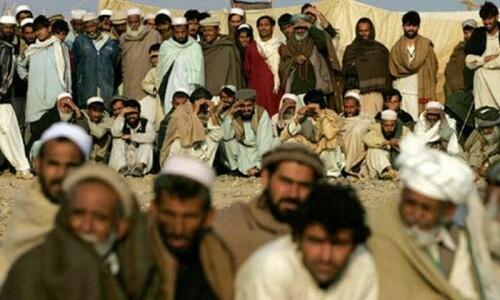WASHINGTON: A former US defence secretary and nine former ambassadors to Afghanistan have warned the Trump administration not to rush into a deal with the Taliban that Washington may have to regret later.
In a signed letter, released by the Atlantic Council, a Washington think-tank, on Tuesday, all nine ambassadors, who have worked in Afghanistan since the removal of the Taliban government, warned Washington that an unplanned withdrawal could push the country back into a “total civil war”.
Gen James Mattis, the Trump’s administration’s first defence secretary, said in a panel discussion at the US Council of Foreign Relations on Tuesday that a rushed withdrawal could force Washington to send its troops back to Afghanistan.
He explained how the United States withdrew from Iraq, ignoring warnings from its military and intelligence officials, and was forced to return.
As predicted, insurgency and terrorism in Iraq grew stronger after a troop pullout and “we had to send the troops back,” the general said.
“Should we not learn from that situation?” he asked. “We can declare a war over,… but the idea that we can now turn our back on this threat and somehow we are going to live in an island in the global community unaffected by it, does not match.”
Gen. Mattis urged US policy planner to “learn from our past” and not make this mistake.
The former US ambassadors to Afghanistan stressed this point more forcefully. “A major withdrawal of US forces should follow, not come in advance of real peace agreement,” they wrote, adding that not doing so could plunge the country back “into a total civil war” that followed the Soviet withdrawal in 1989.
They argued that while some reduction of troop numbers was possible to start negotiations, counter-terrorism forces and US/Nato airpower need to remain to deal with the terrorist threat of IS, Al Qaeda and the Taliban.
Any troop withdrawal schedule, they argued, should “not go on to an automatic glide path,” and should be determined by conditions, not dates.
Writing the day after a draft agreement was announced, the former US envoys warned the Trump administration that its “approach risks spawning more violence and insecurity,” because it had cut the Afghan government out of discussions and had planned the departure of US troops before sealing a full peace agreement.
“We believe that US security and values require” the withdrawal to “come after a real peace,” not before, said the open letter”.
The ambassadors warned that withdrawing US support to Kabul would leave America’s Afghan friends “unable to protect themselves.”
They also urged the Trump administration to ensure that the Afghan elections were held as scheduled, on Sept. 28, allowing the Afghans to “determine their government and who will Those who signed this letter include John Negroponte, a former deputy secretary of state and the first ever US director of national intelligence.
US special envoy for Afghanistan, Zalmay Khalilzad, announced earlier this week that after a year of negotiations, they had reached a draft deal with the Taliban for a US troop withdrawal.
Later, he showed the draft deal to President Ashraf Ghani, although his government was involved in the negotiations.
“There is an outcome far worse than the status quo, namely a return to the total civil war that consumed Afghanistan as badly as the war with the Russians,” the ambassadors warned.
They also cautioned Washington that the negotiations could breakdown if the Taliban realized the Afghan government was too weak to matter.
Published in Dawn, September 5th, 2019

















































